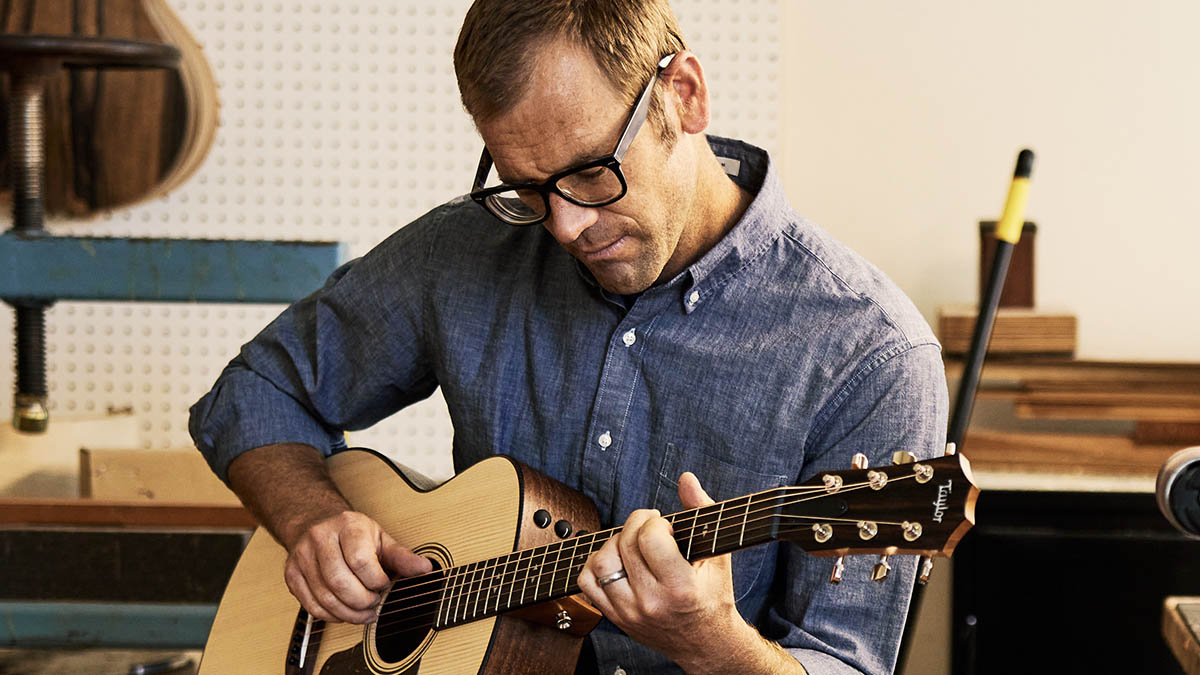Allan Holdsworth talks jaw-dropping solos, the "exquisitely unique" SynthAxe and his love of headless guitars in his final interview
The trailblazing jazz-fusion guitarist passed away just days after taking part in his last-ever interview with Guitar World

On April 15, 2017, just days after completing his final interview with Guitar World (or, for that matter, with any guitar magazine in the world), Allan Holdsworth, the great jazz-fusion guitarist, died at his home in Vista, California.
His career spanned more than four decades, and his playing is largely considered among the best of all time. In this last conversation, we asked the fusion great questions posed by Guitar World readers.
Why do you think your playing attracts both metal and jazz fans? – Sam Kennedy
“My music falls in the cracks between rock and jazz. The sound comes more from rock, but the harmonies are more akin to jazz. Plus, my music has its fair share of guitar solos, which are usually common in hard rock. I’m not a metal guy, by any means, nor am I a mainstream jazz guy, either.”
Your new 12-CD box set, The Man Who Changed Guitar Forever!, is a complete retrospective of your solo albums. Which are your favorites? – Fred Costello
“It’s hard to say, because I’ve played on hundreds of other people’s records. As for my solo albums, I don’t have favorites; they are just snapshots of a different period in time. I enjoyed making them all, but I tend to like the newer rather than the older ones because they more closely represent how my music has evolved. I don’t like the title of the box set – it’s too pretentious. The record company chose it. I would never say that about myself.”
Many of the world’s greatest guitarists – and guitar fans – adulate your playing. Do you realize the impact your playing has made in the guitar world? – Mark Conway
All the latest guitar news, interviews, lessons, reviews, deals and more, direct to your inbox!
Even though many excellent guitarists admire my music, I enjoy their playing as much as they admire mine
“The thought never crosses my mind. The fact that people like my playing is obviously flattering, but I don’t look at my work from other people’s point of view. Even though many excellent guitarists admire my music, I enjoy their playing as much as they admire mine.”
Your guitar solo on Day of the Dead, from Derek Sherinian’s album Mythology (2004), is the most jaw-dropping melodic guitar solo I’ve ever heard. How did it come to be? – Andy Bishop
“When Derek was finishing his album, he told me he’d love for me to play a guitar solo on it, so I did. I recorded a solo for him in the specific length that he requested, and he put it on that track [which also features Zakk Wylde]. People have told me they really like that guitar solo, but I haven’t heard it in years so I don’t remember it. [laughs]”
I know you love beer, and brewed your own at one time. Can you elaborate about that, and what is your favorite beer? – Mike Sabatino
“My favorite is Timothy Taylor, which is brewed in England. I used to brew my own beer, but it’s a lot of work and takes up a lot of room. It’s very cheap to make beer, but the problem is that if you make too much and it sucks, you have to call your buddies and ask them to help you drink it all.”
I read that you are an avid cyclist. Have you ever created a piece in your mind while cycling? – Kenny Kearns
“I have not ridden a bicycle in a few years, and I regret it, because I’ve put on a lot of weight since I stopped riding. When I was younger, I used to ride every day, but as you get older your interests change. Bike riding is great for your thinking. I can’t say I’ve written an entire tune while cycling, but riding has definitely inspired songwriting ideas.”
Music and producing music has changed much over the years with the arrival of digital recording and home studios. Can you share your thoughts on this? – Bob Dyer
“It’s a whole different world now. I float between analog and digital, and combine the two setups into a hybrid. I’ve worked with some great engineers over the years, and they didn’t want to make the change from analog to digital. Whether you like it or not, you have to go where it’s going because much of the analog equipment is obsolete.”
Your guitar playing leaps through the mix on Road Games, yet on Wikipedia it states that it’s one of your least favorite records. Why? – Anthony Fragnito
“I had no control of that record whatsoever. It was a clusterfuck. [Executive producer] Ted Templeman took everything out of my hands. Eddie Van Halen got me the record deal with Warner Bros. The problem was the record company didn’t let me do what I intended.
Once you play a headless guitar, you get used to the fact that there is no headstock, and you’ll never want to play a regular guitar again
“I think they wanted to push my music in a more commercial direction, but I was too stubborn to listen to them so they dropped me after that record. There are only six tracks on it because the record was never finished. It was a miserable period for me. I thought it was going to be great to be signed to a major label, but it turned out to be the exact opposite of what I expected.”
You’ve played Carvin guitars for many years, and often play a Carvin Allan Holdsworth Signature HH2 headless guitar. How did it come about, and why do you like headless guitars? – Ed Simon
“The first headless guitar that I played was a Steinberger – I fell in love with the design. They are extremely comfortable and make perfect sense. They are very stable and sound great, and it’s easier to change strings. Once you play a headless guitar, you get used to the fact that there is no headstock, and you’ll never want to play a regular guitar again. A number of years ago I talked to Carvin guitars, which is now Kiesel, about making me a headless guitar, and I loved it. I’ve been playing headless guitars ever since.”
An interesting phase of your career was your use of the SynthAxe. Do you still play it? – Galen Peterson
“Yes. It’s an exquisitely unique instrument. The SynthAxe enables you to achieve a whole world of sonic textures that you cannot get with a guitar. There was nothing like it before and nothing like it since. I’ve been playing it pretty regularly since Atavachron [1986].
“Bill Aitken from Solid State Logic was the primary inventor. He was a guitarist but he wanted to be able to play synthesizer, so he came up with the idea of making this unusual-looking machine. I played one of the first ones and loved it. It makes no sound of its own because it’s essentially just a MIDI controller.
People used to write notes on my amp, asking me to stop playing the SynthAxe and play the guitar instead
“People used to write notes on my amp, asking me to stop playing the SynthAxe and play the guitar instead. But now people often ask me, 'We’d love to hear you play the SynthAxe – did you bring it?' I rarely play it onstage anymore because it’s too costly to take on the road and it requires a lot of equipment.”
I’ve read that you started out wanting to play saxophone, but couldn’t afford one and ultimately decided to play guitar. True? – Gordon Lee
“I didn’t decide to play guitar, but that was the instrument which I was offered. I’ve always been interested in horn-type instruments, such as a saxophone; but those instruments are very expensive, so my dad bought me a guitar instead. I didn’t like the guitar at first, but after noodling on it for several months, I developed a feel for it. I was around 14 at the time. That was many years – and beers – ago.”
Your playing is the polar opposite of your fusion contemporary Al Di Meola. He pretty much picks every note. You don't. Was there ever a time that you pursued a more standard way of playing guitar where you would utilize the plectrum more? – Jason Jenkins
“When I first started playing, I plunked away just like everyone else. During the ’60s, I played in a blues band for a few years, and I liked it. It wasn’t until I was playing for a while that I made the decision to change my style from a percussive to more of a legato approach. I just wanted a different sound.”
It’s been 16 years since the release of your last studio album, Flat Tire: Music for a Non-Existent Movie. Are you working on any new music? – Albert Morris
“I’m currently working on a new album featuring bassist Jimmy Johnson and drummer Virgil Donati, with myself on guitar and SynthAxe. It’s going to be more aggressive and less jazz-like than Flat Tire. I’m very excited about it. Before I retire or croak – whichever comes first – I’d like to do a few more records. We’ll see what happens.”

